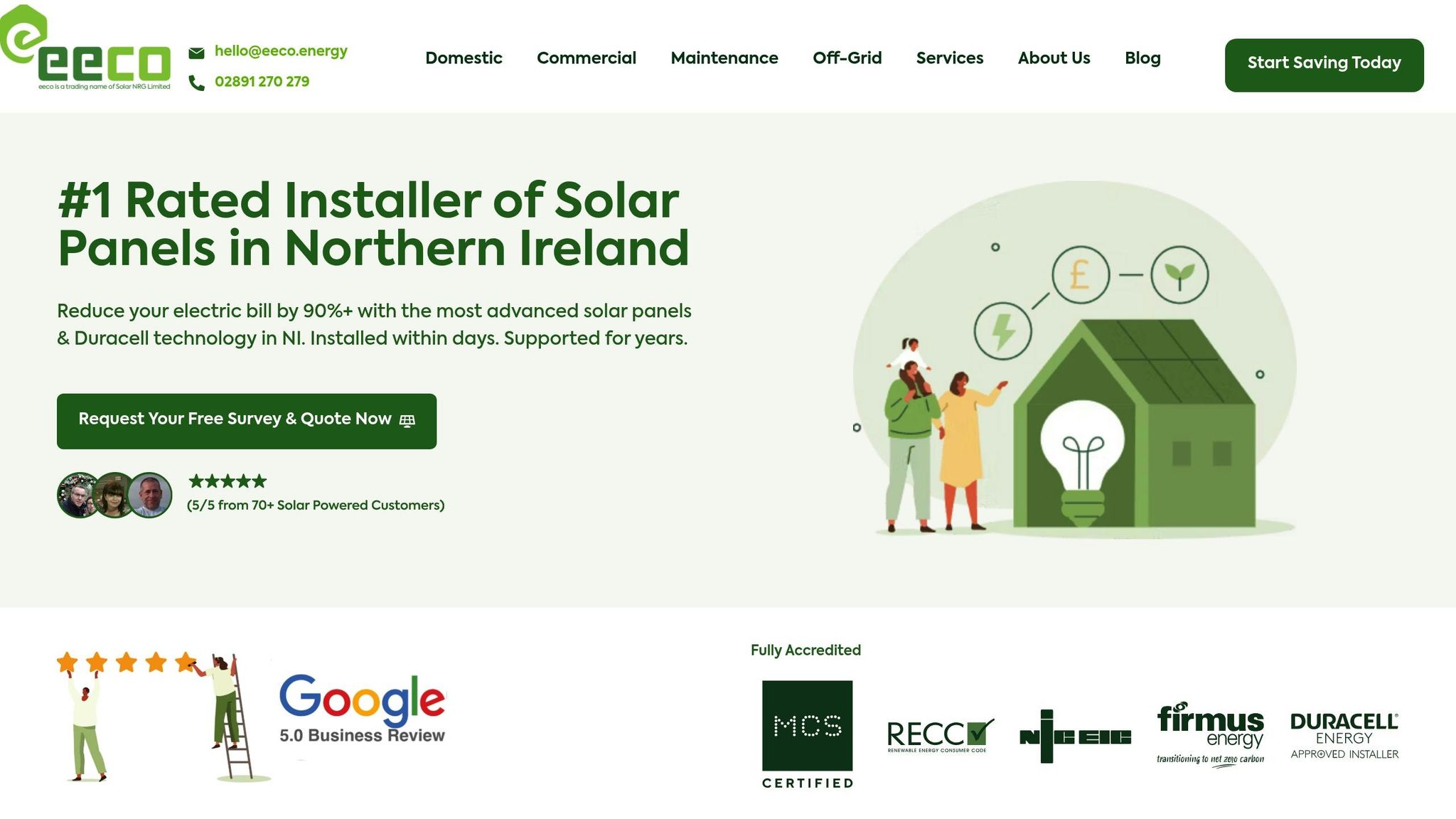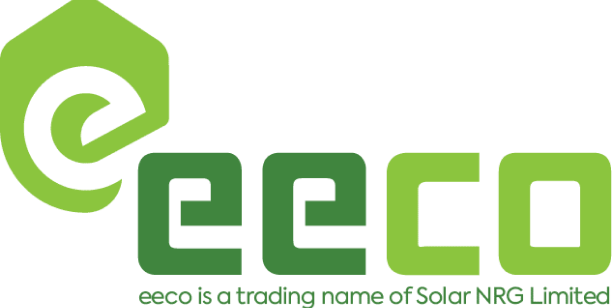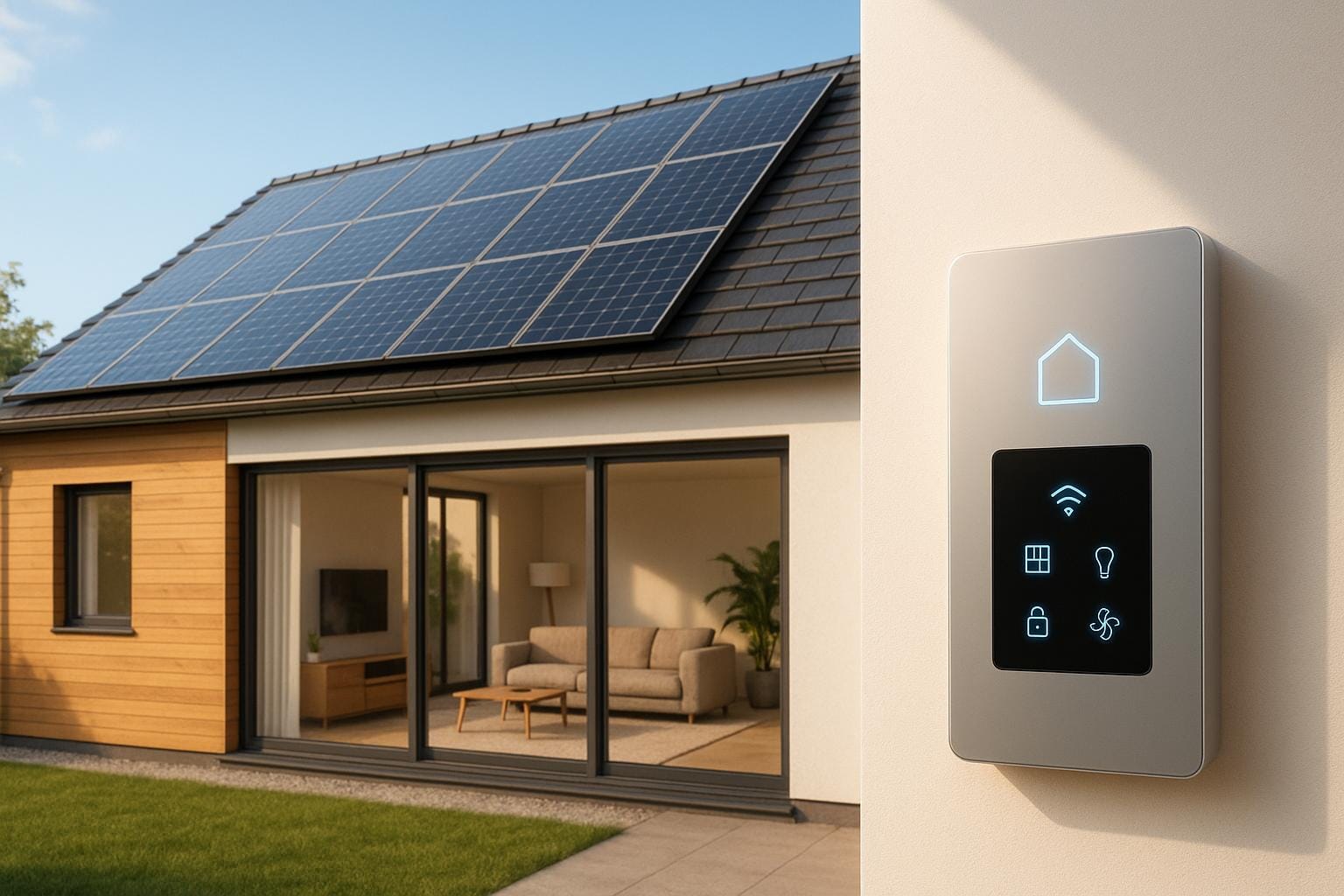Smart home systems paired with solar batteries can help you lower energy bills, reduce reliance on grid electricity, and maintain power during outages. Here’s how it works:
- Efficient Energy Use: Solar batteries store excess energy from your solar panels to power your home when the sun isn’t shining. Smart systems optimise energy usage by running appliances when solar power is available.
- Cost Savings: Use stored energy during peak grid pricing or charge batteries during off-peak hours to save money.
- Backup Power: Solar batteries provide reliable energy during outages, keeping essential devices running.
- Lower Emissions: By prioritising solar energy, these systems cut down on electricity from fossil fuels.
- Remote Control: Mobile apps let you monitor energy use, battery levels, and solar output in real time.
For UK households, especially in Northern Ireland, integrating solar batteries with smart home systems offers a practical way to manage rising energy costs and unpredictable grid conditions. With proper installation, this technology can increase your savings, improve energy independence, and even boost your property value.
How Solar Batteries Connect with Smart Home Systems
Solar Battery Basics
Solar batteries are designed to store excess solar energy – typically ranging from 5 to 15 kWh – using lithium-ion cells tailored for home use. These batteries come equipped with management systems that oversee energy flow and automatically switch between solar power, stored energy, and grid electricity, ensuring a seamless energy supply.
The switching process relies on sophisticated algorithms to identify the most cost-efficient power source based on real-time electricity rates and the battery’s charge status. To maintain peak performance, these systems include thermal regulation, keeping the battery’s operating temperature between 15°C and 25°C. This feature is especially valuable in regions like Northern Ireland, where the climate can be unpredictable.
Smart Home Connection Features
When integrated with smart home systems, solar batteries become more than just energy storage units – they act as intelligent energy managers that interact with your household devices. This integration is made possible through energy management platforms, which link the battery to your smart devices.
Wi-Fi connectivity and API links enable seamless, real-time communication between the battery and your smart home hub. Systems like Samsung SmartThings, Google Nest, and Amazon Alexa can access energy availability data from the battery, allowing them to decide when to operate high-energy appliances efficiently.
API connections provide real-time updates on battery levels and solar generation rates, helping devices like thermostats and washing machines optimise their energy use. In low-power situations, load management ensures essential appliances – such as lighting, fridges, and heating – remain operational, prioritising them over less critical devices.
Some advanced systems also feature predictive scheduling, which analyses weather forecasts and past usage patterns to manage energy distribution more effectively. For instance, if cloudy weather is expected tomorrow, the system might conserve battery power overnight rather than using it for non-essential tasks.
With mobile app control, homeowners can monitor and adjust their energy systems remotely. These apps provide real-time insights into solar generation, battery charge levels, and household energy consumption through user-friendly graphics. They also allow users to tweak settings and receive performance alerts, offering greater control and convenience.
These smart integrations set the stage for the benefits explored in the next section.
Main Benefits of Connecting Solar Batteries to Smart Homes
Pairing solar batteries with smart home systems offers clear advantages in energy use, cost savings, and reducing environmental impact. These benefits come from the seamless integration of smart technology, creating a more efficient and practical way to manage energy. Let’s explore how these benefits play out in everyday scenarios.
Better Energy Efficiency
Smart home systems help cut down on energy waste by scheduling energy-intensive appliances to run when your solar panels are producing the most power. This means any extra electricity can be stored in the battery for later use. For instance, a smart thermostat can work with your solar battery to pre-heat or cool your home during sunny hours, reducing energy use during pricier times.
Lower Electricity Bills
Switching to battery power during peak grid pricing is a great way to save on electricity costs. Smart systems can automatically shift to using stored solar energy when grid prices spike. If you’re on a time-of-use tariff, you can charge your battery when rates are lower and use that energy during peak hours, which can lead to noticeable savings on your monthly bill.
Greater Energy Independence
Solar batteries provide a reliable backup during power outages, keeping essential circuits running for longer. How long they last depends on the battery’s capacity and how much energy you use. Smart systems take it a step further by analysing weather forecasts and your energy habits to reserve stored power for when it’s needed most, giving you more control over your energy supply.
Reduced Carbon Footprint
Using stored solar energy instead of grid electricity helps households lower their carbon emissions. Smart systems ensure energy-heavy tasks, like running a washing machine, are scheduled for times when solar power is available. This reduces reliance on electricity generated from fossil fuels. As the national grid incorporates more renewable energy, the environmental benefits of this approach only increase.
Higher Property Value
Homes equipped with solar batteries and smart energy systems are becoming more attractive to eco-conscious buyers. These features not only improve energy efficiency but can also boost a property’s Energy Performance Certificate (EPC) rating. This added appeal can make such properties stand out in the market and potentially command a higher price.
Practical Uses of Solar Batteries in Smart Homes
Smart homes equipped with solar batteries showcase how seamlessly energy generation, storage, and consumption can work together. These systems operate automatically, simplifying energy management for everyday use.
Automatic Appliance Scheduling
Smart home systems can schedule energy-intensive appliances to run during peak solar production hours, usually between 10am and 3pm on sunny days. For example, your washing machine, dishwasher, or tumble dryer can be programmed to operate when your solar panels are producing the most electricity. This approach ensures you’re using solar power directly instead of pulling energy from the grid.
The system adapts to your household’s schedule, such as running laundry cycles on sunny days. Similarly, electric vehicle (EV) charging can be programmed to prioritise solar energy. When solar power isn’t sufficient, it can switch to charging during off-peak grid hours to save on energy costs.
Smart water heating also benefits from this setup. An intelligent immersion controller can heat your water cylinder during the day using surplus solar energy, storing the hot water for evening use. This reduces the need for expensive electricity during peak hours. Together, these features create a foundation for efficient energy management across your home.
Smart Energy Source Switching
One of the most advanced features of solar battery systems is dynamic energy source management, which optimises energy use in real time. The system automatically selects between solar, battery, or grid power based on current conditions and costs.
When the sun is shining, the system prioritises direct solar usage while storing any excess energy in the battery. If clouds roll in or energy demand spikes, it seamlessly switches to battery power without disrupting your home’s electricity supply. When both solar production and battery reserves are low, it automatically draws from the grid.
This smart switching is particularly effective for time-of-use tariffs. The system can charge your battery during off-peak hours when electricity rates are lower, allowing you to use that stored energy during peak pricing periods. The entire process runs automatically, ensuring you’re always using the most affordable energy source available.
Remote System Monitoring
Modern solar battery systems offer comprehensive monitoring tools, giving you control no matter where you are. With an internet connection, you can track solar generation, battery charge levels, and energy consumption patterns in real time.
These systems also provide performance insights and send alerts to help you manage energy more effectively. For example, they can use weather forecasts to predict energy availability. If heavy clouds or storms are expected, you’ll receive notifications advising you to charge your battery from the grid at cheaper rates or delay energy-heavy tasks until conditions improve. This forward-thinking functionality helps you make the most of your solar setup while maintaining reliable power.
Additionally, many systems include detailed energy usage breakdowns, showing you which appliances consume the most electricity and when. This data can help you shift energy use to solar production hours or replace inefficient devices with more energy-saving alternatives. Together, these tools empower you to stay informed and maximise the value of your solar investment.
sbb-itb-d2d975a
EECO Energy: Solar Battery Installation in Northern Ireland

With over 25 years of experience, EECO Energy specialises in solar battery installations tailored for Northern Ireland. As a Duracell Approved Installer, they offer dependable energy storage solutions, all handled in-house to ensure top-notch quality.
Tailored Solutions for Northern Ireland Homes
EECO Energy designs MCS-accredited systems that are optimised for Northern Ireland’s unpredictable weather, typical energy usage patterns, and local tariff structures. Their battery storage options are flexible and designed to fit your home’s specific energy needs. Choices include the Dyness 10kW system priced at £2,400, Soluna options, and premium Duracell 10kW units at £3,000 and £3,650 respectively. Most installations are completed within a single day and integrate seamlessly with smart home systems, ensuring minimal disruption.
Cutting Costs and Gaining Energy Independence
EECO Energy’s bespoke solutions not only lower energy bills but also provide greater energy security. Solar panels in Northern Ireland can save households between £50 and £180 monthly, with battery storage systems increasing these savings by an additional 20–50%. Over time, this setup can result in lifetime savings of £20,000–£30,000 or more.
Take Lynsey from Belfast, for example. She shared how her monthly energy bill dropped dramatically:
"As a family we’re delighted with the performance we’ve seen from our solar system. My monthly bill is down 90% from ~£200 per month to £20 per month. It’s had a huge impact on our family. EECO Energy clearly explained the cost, expected savings, and outlined the entire installation process step by step. They completed the work quickly, efficiently, and without any hassle. We couldn’t be happier."
These systems not only cut monthly bills but also increase property value and shield homeowners from future energy price hikes. With a 25-year warranty and ongoing support, EECO Energy ensures long-term energy independence and peace of mind.
Conclusion: Smart Energy Storage for Modern Homes
Pairing solar batteries with smart home systems offers an efficient and forward-thinking energy solution for today’s households. Together, they help homeowners manage rising energy costs while reducing reliance on the grid, especially during peak-rate periods.
Beyond savings, solar batteries contribute to cutting household carbon emissions. However, achieving these benefits depends heavily on proper installation and upkeep.
Expert installation is key to unlocking the full potential of these systems. EECO Energy provides installations backed by 25-year warranties and comprehensive maintenance services, ensuring reliability and long-term performance. Their MCS-accredited setups integrate smoothly with existing smart home technologies, giving homeowners instant access to advanced energy management tools.
For homeowners in Northern Ireland, the combination of local expertise, trusted products, and ongoing support makes adopting this technology a solid step toward energy independence. Smart energy storage isn’t just about having a backup plan – it’s about creating a home that actively optimises energy use for better efficiency and a smaller environmental footprint.
This technology equips UK homes with the tools to save money, reduce emissions, and embrace a more sustainable future.
FAQs
How do solar batteries and smart home systems work together to manage energy efficiently in different weather conditions?
Smart home systems combined with solar batteries use cutting-edge technology to make the most of solar energy, adjusting usage based on weather patterns. By processing real-time data and weather forecasts, these systems can store extra energy generated on sunny days and save it for when the skies are overcast or rainy. This ensures a consistent energy supply, no matter the weather.
These systems also fine-tune energy flow by factoring in elements like temperature and cloud cover, which can influence how well solar panels perform. This flexible approach not only helps lower electricity bills but also promotes a more eco-conscious way of living.
How much can a UK household save by combining solar batteries with smart home technology?
By pairing solar batteries with smart home systems, the average UK household could save around £300 annually on energy bills. This reduction mainly stems from maximising the use of self-generated solar power and charging the batteries during off-peak times when electricity rates are lower.
In certain situations, yearly savings can go beyond £500, particularly when you include advantages like decreased dependence on the grid and potential income from exporting excess energy. This approach not only lowers expenses but also helps create a more energy-efficient and environmentally friendly home.
How do solar batteries and smart home systems work together to lower a home’s carbon footprint?
Solar batteries and smart home systems work together seamlessly to lower a household’s carbon footprint by making the most of renewable energy and boosting energy efficiency. Solar batteries store excess electricity produced by solar panels during daylight hours, ensuring that homes can tap into this clean energy even after sunset. This means less dependence on grid electricity, which often comes from fossil fuel sources.
Smart home systems take it a step further by automating and fine-tuning energy use. For instance, they can run appliances when solar power is available or scale back energy use during periods of high demand. By combining these technologies, households can reduce greenhouse gas emissions, cut energy bills, and contribute to the UK’s climate targets.


